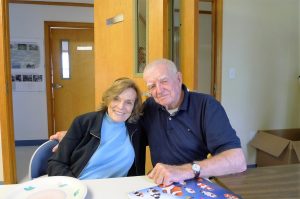Marine Pioneers Sylvia Earle and Tap Pryor Meet Again at CCAR

Sylvia Earle and Tap Pryor, who have both had long and distinguished careers in marine sciences, exploration and innovation, crossed paths again at CCAR on July 14. Dr. Earle led the first all-female team of aquanauts, and on a notable deep ocean dive in 1979 near Oahu she set the depth record by exploring the ocean bottom 381 meters (1,250 feet) below the sea. For this she has earned the honorary title of “Her Deepness”. Among her many other notable accomplishments, Sylvia Earle was the first female Chief Scientist at the National Oceanic and Atmospheric Administration; Curator of Phycology at the California Academy of Scientists; Time Magazine’s first Hero for the Planet in 1986; and founder of Deep Ocean Exploration and Research. Dr. Earle continues to advocate for the oceans and has been a National Geographic Explorer-in-Residence since 1998.
Taylor “Tap” Pryor is a marine biologist who founded Sea Life Park and the Oceanic Institute in Hawaii. He was appointed by President Johnson to the Stratton Commission that wrote the US National Ocean Program and published the first comprehensive US ocean plan “Our Nation and the Sea”. These efforts led to the creation of the National Oceanic and Atmospheric Administration (NOAA), where Sylvia Earle later served as Chief Scientist. Tap Pryor was a principal investigator in the Defense Advanced Research Project Agency (DARPA), and he led Office of Naval Research-funded projects at the Duke University Marine Laboratory and University of Hawaii’s then-Eniwetok Marine laboratory, respectively. During this time he worked with Sylvia Earl’s husband Graham Hawkes, an engineer and submersible designer. Tap later served as Vice President-Research for Aquanautics Corporation, and subsequently lived 20 years in the Cook Islands, where he served 10 years as Deputy Chief of Staff, Office of the Prime Minister. Tap has been an aquatic farmer for many years and he developed a black pearl farm, a fresh water tilapia & vegetable aquaponics operation and an on-land microalgae/oyster aquafarm. In 2009, the latter earned him a United Nations SEED Award “for innovative and sustainable development in a developing nation.” In 2012 Tap and Chris Heinig co-founded RAS corporation to develop Maine’s first land-based recirculating aquaculture farm. The company, now known as Acadia Harvest Inc., is investigating Integrated Multi-Trophic Aquaculture (IMTA) in a specialty built tank system at the CCAR. Tap is also leading an innovative project developing alternative aqua-feeds using fly larvae grown on marine wastes.
Sylvia was accompanied on her visit to CCAR by David Shaw, who has had a long and successful career as a founder, investor, and director of several technology companies, including IDEXX Laboratories, which he incorporated in 1983 in Westbrook, Maine. In 2013 Mr. Shaw was named international sea-keeper of the year, along with other board members of the Sargasso Sea Alliance. Their visit to the CCAR facility was arranged by Joe Migliaccio, Director of Business Development at the Maine Technology Institute. Tap proudly showed Sylvia his IMTA system and the two engaged in a bit of reminiscing. Dr. Earle was especially interested to learn that Tap is developing aqua-feeds that don’t rely on fish meal as their primary component. This research has the potential to address one of the more important issues facing aquaculture: the practice of capturing wild fish in order to feed farmed fish.
Other key players in Maine’s aquaculture industry were present for the event, including Sebastian Belle, Director of the Maine Aquaculture Association, and Chris Davis, President of the Maine Aquaculture Innovation Center. Dr. Earle was pleasantly surprised to find her friend and fellow phycologist, Dr. Susan Brawley of the University of Maine, among the group at CCAR that day. After touring CCAR facilities, including Sea & Reef Aquaculture, the group enjoyed some sashimi and sushi made from California yellowtail freshly harvested out of a CCAR tank system and grown by Acadia Harvest.
